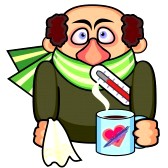
What is Fever or Pyrexia? How to manage it? What are the precautions to be taken? What are the signs and symptoms? What is the cause of this disease? How to treat it? How can homeopathy help you? All of this answered, in this post and of course our doctors always there to help you. Just fill in your details in the form down below and we will answer all your questions for FREE!

What is Fever/Pyrexia?
Fever is defined when a human’s body temperature goes above the normal range
Normal range 36-37C (98-100F).
Fever is a routine symptom in infants and children, which is a normal immune response to infection for generating elevated body temperature.
In very young children and infants, a slightly raised temperature indicates a serious infection.
Normal body temperature varies throughout the day –like it is lower in the morning and higher in the afternoon and evening.
Immunization in children or teething can cause a low-grade fever.
Fever is the result of a body’s immune response to a foreign invader. These foreign invaders include viruses, bacteria, fungi, and other viruses.
A digital thermometer is used to measure rectal, oral or axillary temperatures.
• The temperature in the mouth is over 37.7C (99.9F)
• The temperature in the rectum (anus) is over 37.5-38.3C (100-101F)
• The temperature under the arm or ear is over 37.2C (99F).
How to measure a fever?
• Clean the thermometer with alcohol and rinse.
• Placing the tip of the thermometer under the tongue.
• Keeping the mouth closed.
• The thermometer should remain in place for one-two minutes.
• Avoiding hot or cold drinks before temperature measurements
Rectal temperature will read approx 1 degree higher than an oral temperature.
What are the causes of fever?
• Infection
• Rheumatoid arthritis
• Medications
• Sun exposure /heat stroke
• Auto-immune disease, inflammatory disorders
• Seizures
• Cancer
• Medications reactions
• Ulcerative colitis
• Blood clots
• Urinary tract infections
• Respiratory infections
• Skin infections
• Fever after immunization
• Ear infection
• Sinus infection
• Viral and bacterial gastroenteritis
Physical activity, strong emotion, eating, heavy clothing, medications, and increased humidity increases body temperature.
What are the signs and symptoms of fever?
• Headache
• Feeling of cold
• Anorexia –lack of appetite
• Dehydration
• Depression
• Lethargy
• Sweating
• Difficulty in concentration
• Sleepiness
• Weakness rapid heartbeat
• Severe vomiting
• Fever blisters
• Neck stiffness
• Confusion
Children with fever may develop febrile seizures
What are the investigations of fever?
• Physical examination –skin, eyes, ear, nose, throat, neck, chest and abdomen
• Blood test (complete blood count )
• X-ray of chest
• Urinalysis
What treatment is advised for fever?
• NSAIDs ( non-steroidal anti-inflammatory drugs )
• Antibiotic
• Rest
• Removing excess clothing or blankets in high fever
• Room temperature to be comfortable not too cold or not too hot.
• A sponge bath is a good option
What is the prognosis for fever?
The prognosis for a fever depends upon the cause, depending upon the underlying cause antibiotics and proper medications can be given.
What are the complications of fever?
• Seizures
• Dehydration
• Hallucinations
What is the diet and management of fever?
• Maintaining hygiene
• Washing hands before and after food
• Healthy diet
• Regular exercise
• Drinking a lot of fluids
• Consuming a lot of fruits and vegetables
• Avoiding contact with infected people
• Dress in light clothing
What are the commonly indicated homeopathic remedies for fever?
Aconitum Napellus
Belladona
Bryonia
Gelsemium
Sulphur
For more information, you can visit Wikipedia and MedicalNewsToday.
We have a strong web presence all across the globe with patients in major countries like United States, Australia, United Arab Emirates, Canada, United Kingdom, most European countries, & even smaller counties like Uganda, Nepal, Bangladesh and many more.
We have a very efficient team of doctors which includes the right combination of highly experienced doctors and the doctors of the new age.
Our main aim is to make the patient comfortable so that the case can be taken with ease and the patient be treated properly.
** The text on this website is sourced from websites like emedicine and/or other verified material by government agencies around the globe along with valuable inputs and additions by our team. The content of this page is proofread and updated by the team of doctors, every once in a while, to provide the most accurate information.